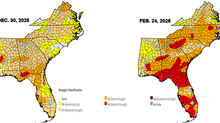Farm Bureau: Farmers urgently need economic assistance
- Nov 25, 2025
- 2 min read
Updated: Nov 30, 2025
By John Newton, VP of Public Policy and Economic Analysis, American Farm Bureau Federation
Washington, DC -- USDA's most recent Commodity Costs and Returns, World Agricultural Supply and Demand Estimates and Farm Sector Income & Finances reports confirm what those in agriculture have known for several years: U.S. farm income is under immense pressure as input costs have increased dramatically while crop prices have fallen sharply - resulting in crop and specialty crop margins that have been at or below breakeven for several consecutive years.

While recent trade frameworks provide optimism for increased exports and market access, products have yet to move in significant volumes and cash prices for commodities such as corn, soybeans, wheat and cotton remain under pressure and are at or well below levels experienced at the beginning of the year. For farmers who had to sell at harvest price lows due to the lack of storage, the benefits of recently announced trade frameworks will come too late.
Key Takeaways
*Farm financial stress is severe and persistent. Margins are below breakeven for many crops, working capital has been eroded, Chapter 12 farm bankruptcies are on the rise and according to a recent survey of commercial lenders, profits will remain elusive going into 2026.
*Trade losses have compounded economic pressures. Farmers have experienced multi-billion-dollar export declines in some of our largest trading markets, including China. Trade frameworks have been announced, but increased export volumes have yet to materialize and cash prices remain at or below levels seen in early 2025.
*Without action, long-term viability is at risk. Additional financial support is critical to offset trade losses and provide a bridge until farm bill enhancements from the One Big Beautiful Bill Act go into effect. This will stabilize the farm economy, sustain rural economies and maintain affordable food prices.
While recent trade frameworks provide optimism for increased exports and market access, products have yet to move in significant volumes and cash prices for commodities such as corn, soybeans, wheat and cotton remain under pressure and are at or well below levels experienced at the beginning of the year. For farmers who had to sell at harvest price lows due to the lack of storage, the benefits of recently announced trade frameworks will come too late.











































Comments